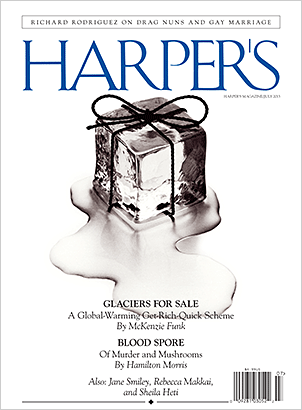Introducing the July 2013 Issue of Harper’s Magazine
A global-warming get-rich-quick scheme, a magic-mushroom murder, and more
Our cover story this month takes on some of the biggest crises of the day: financial fraud, climate change, and water shortages. All three come together in the story of Otto Spork, a Canadian dentist who persuaded hundreds of investors to buy into a phony plan to sell water from Iceland’s glaciers directly to the drought-prone nations of the world. After his scam collapsed — leading some to compare him to Bernie Madoff — he disappeared. Our reporter McKenzie Funk spent five years chasing after Spork, traveling from Ontario to Iceland to Palm Beach and talking with a variety of shadowy informants and grifters looking to cash in on climate change. Funk’s Spork saga (say it three times fast) is a crash course in the absurdity of the financial world and a preview of the thirsty future that awaits us all.
In “Blood Spore,” the intrepid Hamilton Morris delves into the 1980 murder of Dr. Stephen Pollock, whose pioneering research on magic mushrooms also made him into something of a mycological kingpin, selling psychedelic spores via mail order. This true-crime story takes the author from San Antonio, Texas (where Pollock died), to Amsterdam, where two entrepreneurs known as the Truffle Brothers manufacture nearly 20,000 tons of fungal gold per year. Morris never quite unravels the mystery of Pollock’s death, although a conversation preserved on an ancient cassette tape points glaringly toward collusion by the local police. But he does provide a vivid, comical, and frequently surreal window into the world of mycological obsessives, who wander the earth with their “eyes perpetually narrowed, minds bent on finding the precious fruit others squash under heel and haunted by the knowledge that no matter how hard they look something will always have escaped them.”
Elsewhere in the issue, Mark Edmundson deplores the state of American poetry, with its narcissistic tone and puny ambition. Thomas Frank considers a trio of Eighties-era empire builders (Margaret Thatcher, Al Neuharth, and Howard Phillips), Jeff Madrick argues that bankruptcy isn’t so bad after all, and Jane Smiley surveys several new memoirs — a form she calls “tempting but treacherous.” Russell Mokhiber’s Annotation, “Plaque Ops,” reveals the corporate conquest of Cornell University’s School of Industrial and Labor Relations. And Julie Hecht’s story, “May I Touch Your Hair?,” looks back to summers spent at the beach during the Fifties — a touching remembrance of a coiffure-fixated childhood.



